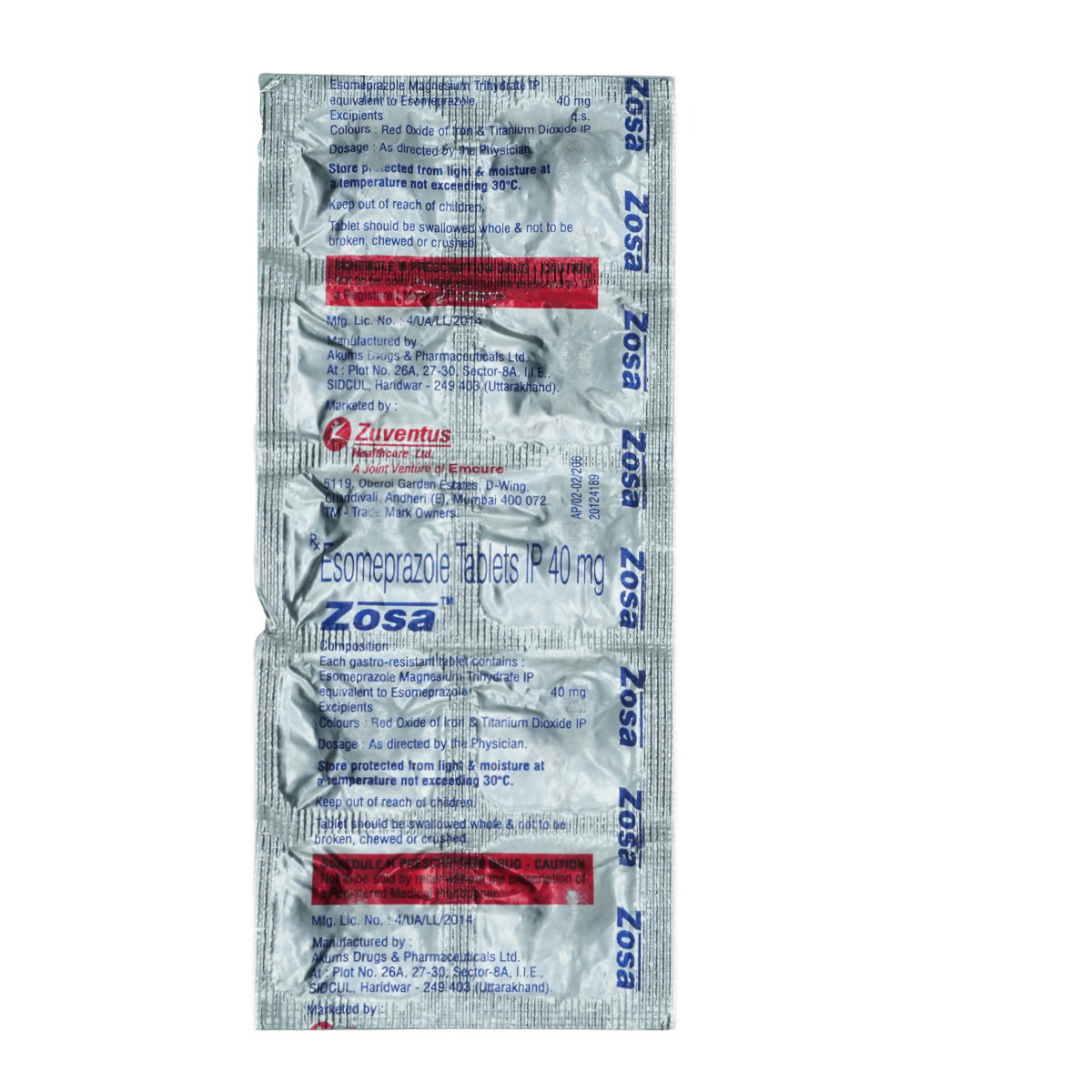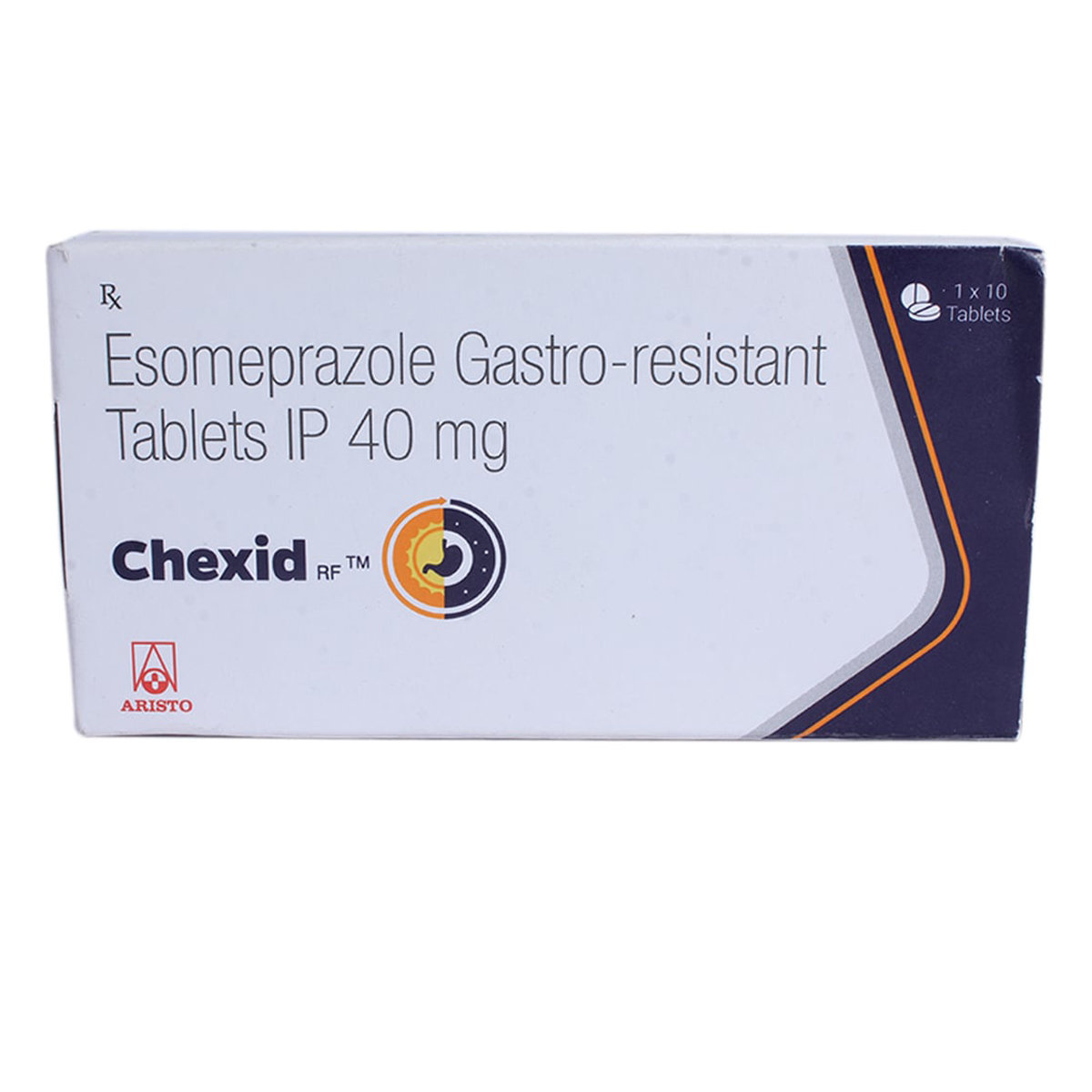Esomeprazole
About Esomeprazole
Esomeprazole belongs to the class of drugs known as Proton pump inhibitor which reduces the amount of acid your stomach makes. It treats gastroesophageal reflux disease (GERD), stomach ulcers and Zollinger Ellison syndrome (overproduction of acid due to pancreatic tumour).
Esomeprazole helps in reducing the stomach acid by blocking the actions of an enzyme (H+/K+ ATPase or gastric proton pump). This proton pump lies in the cells of the stomach wall responsible for the release of gastric acid secretion damaging tissues in the food pipe, stomach, and duodenum. Esomeprazole prevents the release of stomach acid and relieves symptoms of food pipe lining inflammation (esophagitis), and gastroesophageal reflux disease (GERD), or heartburn.
Take Esomeprazole 1-2hours prior food. You are advised to take Esomeprazole for as long as your doctor has prescribed it for you depending on your medical condition. An adult taking Esomeprazole might have common side effects like headache, diarrhoea, nausea, abdominal pain, vomiting, flatulence, dizziness, and arthralgia (joint pain). In the case of children taking Esomeprazole might report upper respiratory tract infections (URI), headache, fever, diarrhoea, vomiting, rash, and abdominal pain. These side effects are temporary and may get resolve after some time however if this side persists contact the doctor.
Esomeprazole is safe for pregnant and breastfeeding mothers but should be taken only after consulting a doctor. Tell your doctor if you have stomach or intestinal cancer, liver problem, allergic to Esomeprazole, or will have an endoscopy in the future. Prolonged intake of Esomeprazole may cause deficiency of Vitamin B12 and low level of calcium, magnesium, and Vitamin D leading to osteoporosis.
Uses of Esomeprazole
Medicinal Benefits
Esomeprazole is effective at healing erosive esophagitis (inflammation of food pipe), relieving symptoms of gastroesophageal reflux disease (heartburn), and Zollinger-Ellison syndrome. Esomeprazole works by irreversibly blocking the proton pump gate (which secretes stomach acid). It can be prescribed to all age groups including special populations like the elderly, pregnant, lactating mothers, kidney, and liver disease patients. Usually, no dosage adjustment is required for these groups.
Directions for Use
Storage
Side Effects of Esomeprazole
In adults
- Headache
- Diarrhoea
- Nausea
- Abdominal pain
- Vomiting
- Flatulence
- Dizziness
- Arthralgia (joint pain)
In Children
- Upper respiratory tract infections (URI)
- Headache
- Fever
- Diarrhoea
- Vomiting
- Rash
- Abdominal pain
Drug Warnings
You should avoid taking Esomeprazole if you are allergic to Esomeprazole or proton pump inhibitors, have gastric cancer, liver disease, low magnesium level (osteoporosis), low vitamin B12, pregnant or planning for pregnancy, and breastfeeding mothers. Esomeprazole may interact with a blood thinner (warfarin), antifungal (ketoconazole), anti-HIV drug (atazanavir, nelfinavir), iron supplements, ampicillin antibiotic, anti-cancer drug (methotrexate). Let your doctor know if you are taking these medicines. Prolonged intake of Esomeprazole may cause lupus erythematosus (an inflammatory condition in which the immune system attacks its own tissues), Vitamin B12, and magnesium deficiency. Intake of Esomeprazole may mask the symptom of gastric cancer, so if you have any severe stomach pain or gastric bleeding (blood in mucous or stool) immediately consult the doctor.
Drug Interactions
Drug-Drug Interactions: Esomeprazole may interact with a blood thinner (clopidogrel, warfarin), antifungal (ketoconazole, voriconazole, itraconazole, posaconazole), anti-HIV drug (atazanavir, nelfinavir, rilpivirine), anti-viral drugs (nelfinavir), iron supplements, antibiotic (ampicillin, rifampicin), heart medicine (digoxin) and anti-cancer drug (methotrexate). Let your doctor know if you are taking these medicines.
Drug-Food Interactions: Esomeprazole interact with St John's wort plant that is used as an anti-depressant. This plant may affect the working of Esomeprazole. So avoid its intake with Esomeprazole.
Drug-Disease Interactions: Esomeprazole should be not given in patients with Clostridium difficile associated diarrhea, magnesium and Vitamin B-12 deficiency (increased risk of bone fracture), atrophic gastritis (inflammed lining of stomach), and acute interstitial nephritis (inflammed cells of kidney).
Drug-Drug Interactions Checker List:
Safety Advice

Alcohol
cautionDrinking alcohol with Esomeprazole may cause dehydration and elevate the level of stomach acid thereby decreasing its efficiency. So try to avoid, limit alcohol or contact doctor before intake of Esomeprazole.

Pregnancy
cautionEsomeprazole isn't usually recommended during pregnancy as there's no firm evidence it's safe. So, contact a doctor before intake of Esomeprazole. Your doctor will weigh the benefits and any potential risks before prescribing it to you.

Breast Feeding
cautionEsomeprazole passes into the breast milk. However, no evidence of risk has been reported. Please consult your doctor before intake of Esomeprazole. Your doctor will weigh the benefits and any potential risks before prescribing it to you.

Driving
cautionIn some cases, Esomeprazole may cause dizziness, sleepy, or blur vision. If you observe these symptoms do not drive or operate heavy machinery until you feel better.

Liver
cautionEsomeprazole should be taken with precaution in patients with liver disease.

Kidney
cautionPatients with kidney disease should consult a doctor before taking Esomeprazole.

Children
cautionEsomeprazole should not be prescribed for children under 5 years of age. Esomeprazole is generally prescribed from 5-16 years of children for the treatment of acid-related damage of the food pipe (erosive esophagitis).
Habit Forming
Diet & Lifestyle Advise
- Avoid intake of acid or heartburn triggering foods or drinks like onions, peppermint, chocolate, caffeinated beverages, citrus fruits or juices, tomatoes and high-fat and spicy foods.
- Before going to sleep try to raise your bedhead so that your head and chest are higher than your feet. Do not use piles of pillows, instead, one raised block is fine. This will not allow the stomach acid to backflow through your food pipe.
- Avoid taking alcohol and smoking cigarette. Alcohol can raise the level of production of stomach acid leading to heartburn and acid reflux. On the other hand, nicotine smoking damages the valve (sphincter) which prevents backflow of the stomach acid back into the food pipe.
- Include high fibre containing foods, berries, cherries, leafy green veggies (kale, spinach) and black peppers in your meal. These foods are full of antioxidant, calcium and vitamin B 12 that can help cope with the long term effects of the medicine. Fermented dairy products like miso, sauerkraut, and kimchi contain probiotics which help in the prevention of excess stomach acid production. Cranberry juice can be beneficial in the peptic ulcer and H Pyroli infection.
- Avoid regular sitting continuously, as it can increase stomach acid production. Try to take a break of 5 minutes in 1 hour by brisk walking or stretching.
Special Advise
Prolonged intake of Esomeprazole may be associated with increased risk of Clostridium difficile associated diarrhea, magnesium and Vitamin B-12 deficiency (increased risk of bone fracture), atrophic gastritis (inflammed lining of stomach), and acute interstitial nephritis (inflammed cells of kidney).
Patients Concern
Disease/Condition Glossary
Normally a thick layer of mucous protects the stomach against its own acid secretion. But, in long run, it gets eroded by excessive stomach acid production leading to complications like GERD, peptic ulcer, and Zollinger Ellison syndrome. Gastroesophageal reflux disease (GERD) is a gastrointestinal disorder that occurs when stomach acid frequently flows back into the food pipe (esophagus). This backflow (acid reflux) irritates the food pipe that causes heartburn. On the other hand, peptic ulcer is a painful condition followed by the development of sores or ulcers in the stomach lining or duodenum (first part of the small intestine) (the duodenum). Zollinger Ellison syndrome is a rare condition in which a gastrin-secreting tumor of the pancreas causes excessive acid production leading to peptic ulcers.
FAQs
Esomeprazole is a proton pump inhibitor (PPI), which is a type of medication. Proton pumps are enzymes found in the stomach lining that aid in the production of acid needed for digestion. Esomeprazole impairs the function of proton pumps. This decreases the quantity of acid produced by the stomach.
Prolonged intake of Esomeprazole may lead to atrophic gastritis (inflammation of stomach cells), Vitamin B12 deficiency and weakening of bones or osteoporosis (loss of calcium, magnesium and vitamin D). Your doctor may prescribe calcium, vitamin D or haemoglobin enhancing medications to cope with long term side effects.
No. Esomeprazole prevents excess production of stomach acid causing acid reflux and heartburn. If blood is coming in your stool or mucous immediately contact the doctor.
Yes. Esomeprazole can alter certain medical tests like neuroendocrine tumours (secretin stimulation test), and urine screening tests for tetrahydrocannabinol (THC). So before undergoing such diagnostics test contact your doctor.
It is very unlikely that taking one or two extra doses by accident will cause any problems. However, you should check with your doctor if you have taken too much and have are feeling sweaty, have a fast heartbeat, are feeling sleepy.
There's no firm evidence to suggest that taking Esomeprazole will reduce fertility in either men or women. However, speak to your doctor if you're trying to get pregnant and do as advised.
You can eat and drink normally while taking Esomeprazole. However, you should avoid foods that seem to make your indigestion worse, such as rich, spicy and fatty foods. You should also cut down on caffeinated drinks, such as tea, coffee and cola, as well as alcohol.
No. Gas and acidity are two different common discomforts. Acidity is caused when improper functioning of the valve (sphincter) is located at the junction of the stomach and food pipe. As a result stomach acid backflows and enters the upper part of the food pipe causing heartburn. On the other hand, gas is the result of the digestion of the food and drinks eliminating gases like carbon dioxide, hydrogen, nitrogen, methane, etc. from the body.







